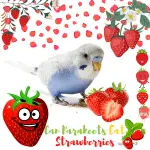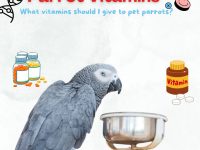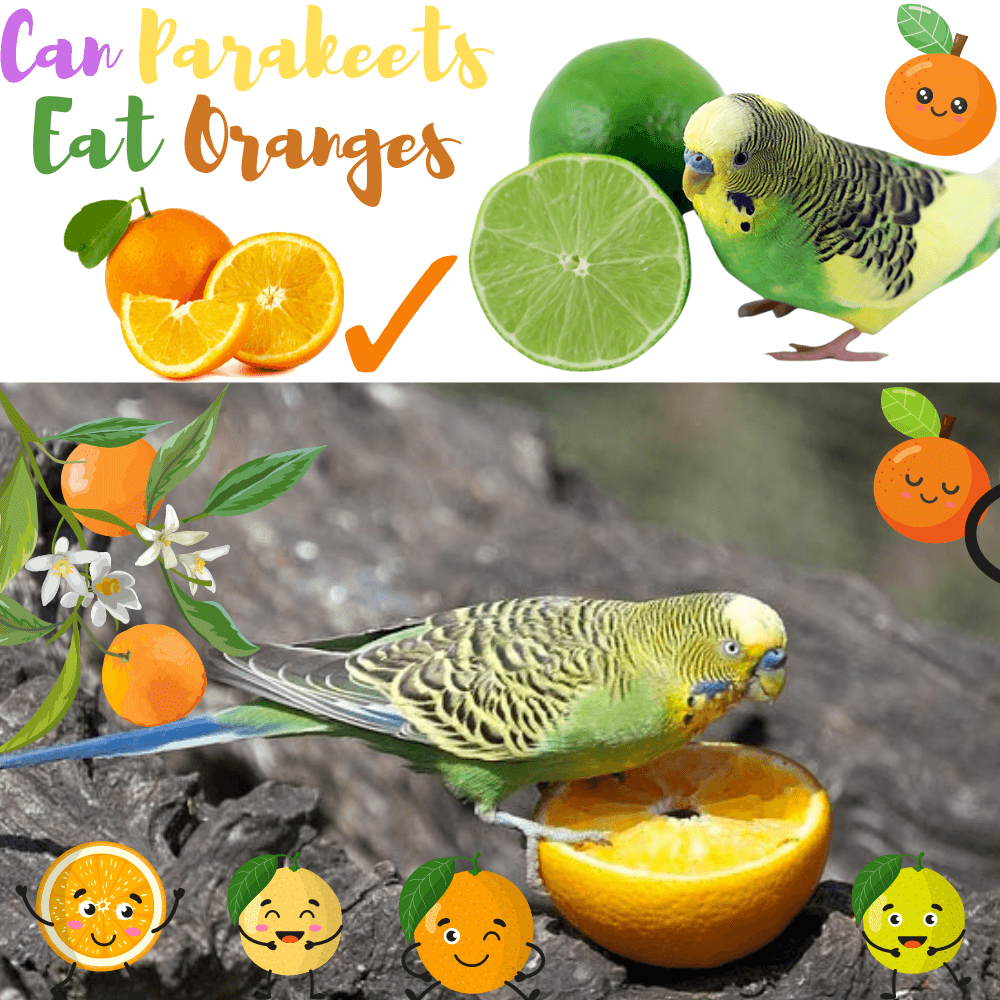
Can Parakeets Eat Oranges? Becoming a parent of a pet can be analogous to having human children in some ways. On the one hand, you may find yourself asking very mundane, but very specific and important questions in the moment, for which you do not have an immediate answer. A good percentage of these questions can be along the lines of “can my parakeet my parrot pet eat this?”.
If you own a budgie, the answers may be even less intuitive than for a cat or dog. But if your question today is about the diet of budgies and, in particular, whether budgies can eat oranges, you’re in luck! This article is for you.
Can budgies eat oranges?
Yes! Pet experts recommend giving oranges and other fresh fruit to budgies. Parakeets enjoy oranges as part of a varied diet that provides them with all the nutrients they need to stay healthy and as a sweet treat. However, since fruits like oranges are rich in sucrose, you should be careful not to give too many oranges and other sweet foods.
Can budgies eat orange seeds?
Can budgies eat orange seeds? Yes, orange seeds can be digested by budgies, just like other citrus seeds such as grapefruit or lemon seeds.
When buying budgie food in a pet store, it contains mainly seeds. So it seems natural that fruit seeds are suitable for budgies. In most cases, this is true, but it is sometimes tricky to know what is safe and what is not.
Other types of edible seeds include those from:
- Grapes
- Watermelons
- Grenades
- Cranberries
- Cantaloupes
Pumpkin and squash seeds are examples of non-fruit seeds that are also acceptable.
The fruit seeds you should NOT give a budgie are apple seeds. You also can’t let them chew fruit pits such as nectarines, peaches, cherries, plums, etc. All these fruits contain cyanide, which can be fatal to a budgie, even in small doses.
Can parrots eat oranges?
Yes, all parrots small and medium, and big parrots like The African grey, Amazon parrot, Macaw Parrots, Eclectus parrot, Quaker parrot, Senegal parrot, Lovebird, Conure, and Cockatiel. can eat oranges since they are safe fruits for parrots
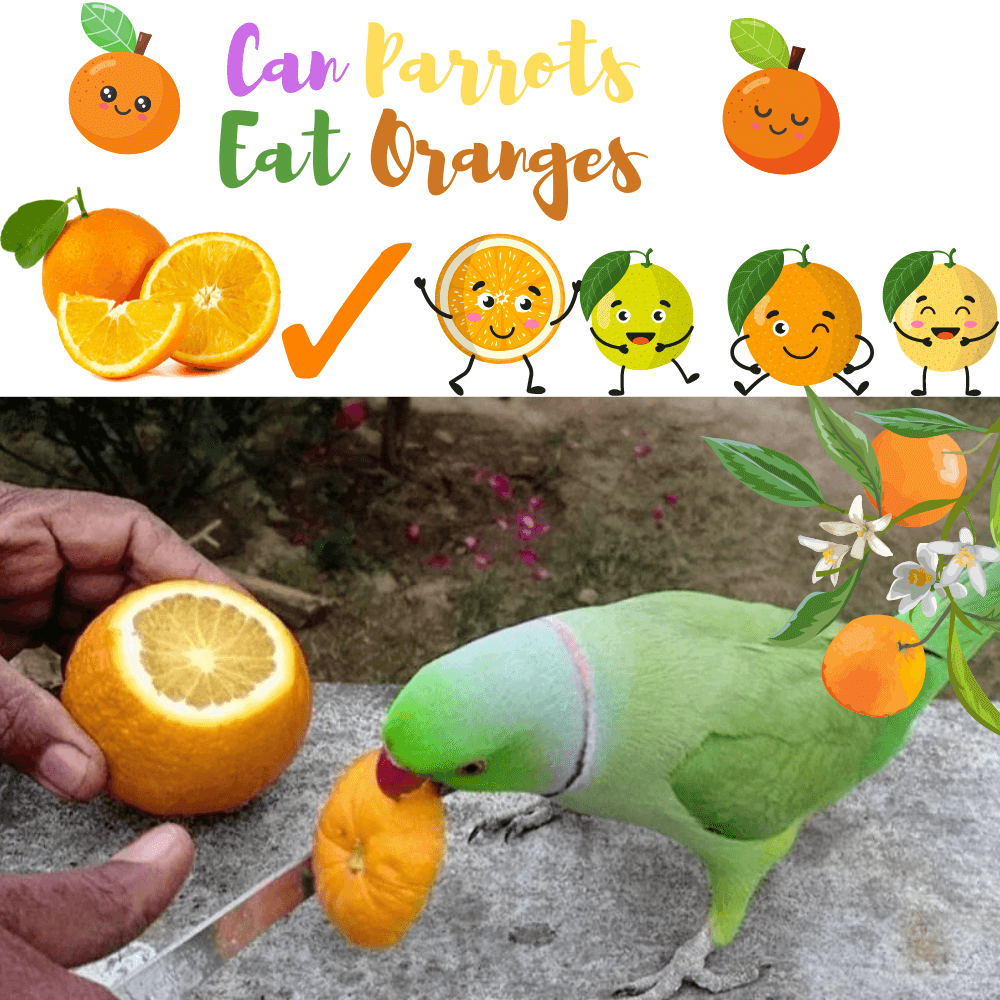
Can budgies eat orange?
Yes, absolutely all budgie mutations can eat oranges because it is a very healthy fruit and it is very important in the cold season because they contain natural vitamins for parrot, like vitamin C and provide also the budgie with vital doses of fiber, calcium, and zinc.
Can Parakeets Eat Oranges
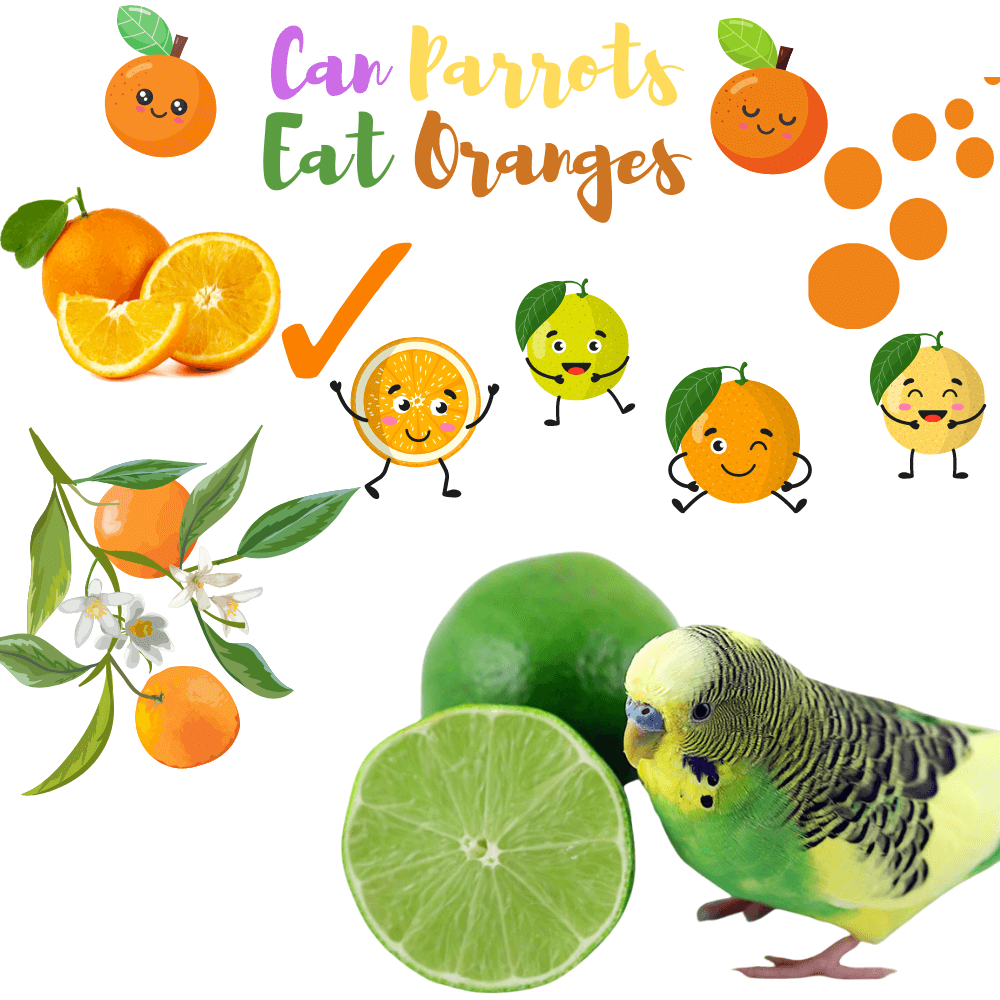
What should I give to a budgie?
What should I give to a budgie? Parakeets can and should eat a wide variety of food. Birdseed can be a big part of their diet, but it’s still not enough. By supplementing their diet with fresh fruits and vegetables, nuts, and other foods, they will receive enough nutrients to be healthy.
Fruit
Oranges, as we now know, are a great snack for budgies. Beyond that, the list of edible fruits is quite long. This is not surprising considering that parakeets are a species of parrot and that they are native to the Australian tropics where fleshy and sweet fruits and berries are naturally accessible to them.
Besides oranges, the most common fruits you can give your budgie are apples, bananas, mangoes, apricots, melons, pineapples, and coconuts. Berries such as blueberries, blackberries, and strawberries are also suitable.
You can find here all you need to know about parrot fruit:
Vegetables
Fresh vegetables are as important an element as fruit in your budgie’s diet. They contain a wide range of vitamins and other nutrients, so it’s worth varying the foods you give, even in this category.
Leafy vegetables like kale, lettuce, spinach, and sprouts are excellent sources of Parakeet vitamins A, E, K, and C. They also provide your budgie with vital doses of fiber, calcium, and zinc. Here is a list of other vegetables that are good options for budgies:
- Carrots
- Maize
- Pea
- Potatoes
- Cucumber
- Zucchini
- Asparagus
- Celery
One caveat: some upper parts of plants, such as potatoes, can be dangerous for your budgie. So be sure to give it only the parts that humans normally eat.
If you’re wondering about beans, good news! Beans are an excellent source of protein and fiber for budgies, but you should only give them cooked beans. Raw beans are unfortunately toxic to them.
Can Parakeets Eat Oranges
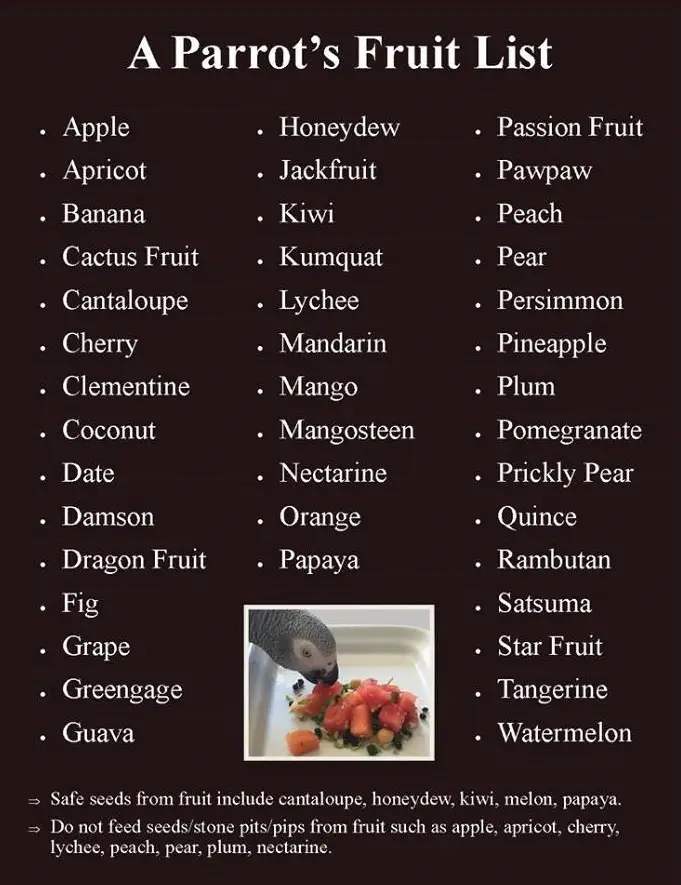
Nut
As with humans, nuts are a healthy, easy, and delicious food option for budgies. You’ll need to cut them into pieces to avoid choking, but walnuts, pecans, peanuts, almonds, and pistachios, the most commonly found in grocery stores, are great for birds.
Grain
Parakeets are actually granivorous, which is part of the reason why many commercially available budgie foods are entirely seed-based. You can also give them other sources of cereal, such as pieces of wholemeal bread and dry rolls, as long as you cut them into small pieces.
Pellets are another common food for budgies. They are a potentially viable everyday food alternative to birdseed for your budgie, provided you take care to get a high-quality brand, like those sold in pet stores.
Treatments
Who doesn’t love a good treat from time to time? Your budgie, certainly! With all the things they can (and can’t) eat, it can be hard to guess what little something extra can be shared with them. Luckily, we have a few ideas to inspire you:
-Millets are a proven treatment for birds. They are made from grass seeds, and you can hang them from the bars of the cage.
-Parakeets love pasta, whether cooked or dried. It is dense in carbohydrates, which gives them energy. Just be sure to let it cool and make sure the hard pieces are small enough to eat.
-Honey is certainly a suitable treat for birds. However, since it is very high in sugar, it should only be given a small amount from time to time.
-Other foods intended for humans are subject to a selection that may surprise you. Baby food is an example, but you should only use vegetable foods made entirely with natural ingredients. Some proteins, such as cooked chicken, canned tuna, corn, and boiled eggs, can also be given sparingly.
What not to feed
The list of foods you should not give your budgie is almost as long as the list of foods you should give him. The most toxic foods to avoid are:
- Chocolate
- Onions
- Garlic
- Lawyers
- Sugar-free candies
- Foods high in sugar, sodium, or fat
- Some plants (make sure you know what you’re feeding before serving)
Peanut products are also not recommended, as are dairy products, mushrooms, crackers, and tomatoes. These foods are not necessarily extremely toxic, but they can make your budgie sick or simply offer no nutrition at all.

How should I feed a budgie?
How to feed a budgie? How you feed your budgie is almost as important as what you give it. The most important thing is to make sure that the food is in sufficiently small pieces or breaks easily (so that the budgie does not choke), that it is not served hot and that it is not given too often if too much poses a threat to health.
Small bites
Parakeets can nibble on certain foods with their little beaks, but many of the treats we want them to enjoy are too hard, almost impossible, or even dangerous, for them to try to chew on their own. Often it is good to cut fruits, vegetables, and other treats into small pieces. For a budgie, this is equivalent to the value of a finger.
Harder foods, such as nuts, should be diced even smaller. Parakeets have a throat, stomach, and tiny internal organs. This makes it easy for them to choke or develop impaction, which can quickly put their lives at risk.
Not too much sugar
Oranges and other sweet treats can be very healthy for budgies, as we have seen. However, the rule of everything in moderation applies here. Oranges are of course rich in vitamin C and very moisturizing, but they are also very sweet.
While some experts recommend consuming about half a cup of fruits and vegetables a day, others advise giving sweet fruit to budgies only twice a week.
Only fresh products
Fruits and vegetables should only be given to your budgie if they are fresh. Remove uneaten waste from the cage at the end of the day to prevent it from spoiling and making your bird sick. Also avoid giving your budgie canned fruit, canned or processed fruit, as the extra ingredients and sugars are not healthy for her.
Make it interesting
Cage life can get very boring. In addition to a good diet, the other reason to give budgies a variety of food choices is simply that the same food every day actually annoys them and tarnishes their lives and attitudes.
To prevent the animal from getting bored, you can change the way you feed it to make it more difficult or turn it into a thinking exercise. To do this, you can hang pieces of food in different places in the cage and/or make a skewer with pieces of fruits and vegetables.
Not too hot
Parakeets like to eat warm fruit. So you can consider heating them before serving them, but whether you’re heating the food or serving it freshly cooked, make sure it’s not too hot.
Hot food can burn their tongue and throat, just like humans, but if it’s only temporary discomfort for us, food burns can potentially seriously injure a budgie.
Conclusion
While general articles like this should not be equated with professional veterinary advice, here we have summarized much of the common knowledge regarding budgie diets and dietary needs. It is certain that budgie owners around the world feed their birds oranges every day. So you can give this fruit to your budgie with confidence.
Don’t forget to prepare the oranges well so that they are easy to consume, moderate the amount administered and let your budgie enjoy the treat you have given him!
Fresh orange fruits Healthy nutrition for Budgies
SOURCE:Alen AxP


